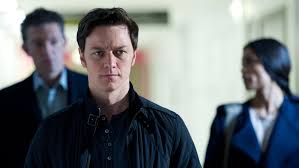Eye For Film >> Movies >> Trance (2013) Film Review
Trance
Reviewed by: Val Kermode

This latest offering from Danny Boyle employs two of cinema's favourite themes: hypnotism, much used in film noir (e.g. Nightmare, Whirlpool and of course Hitchcock's Spellbound), and the planting of false memories (Blade Runner, Inception, Shutter Island).
With his usual flair, he dispenses with opening credits and plunges us straight into the action, a robbery at an art auction, a fast-moving heist that gives us no time to blink. James McAvoy, now bearing a distracting likeness to David Cameron, is the one who gets hit on the head and loses some of his memory, leading to one of Danny's little torture scenes (a bit of finger cutting that is important to the plot), before hypnotist Elizabeth (Rosario Dawson) is brought in to do her work. At stake is a multi-million pound painting by Goya, which art dealer Simon (McAvoy), robber Franck (Vincent Cassel) and his gang would dearly like to recover.

The beautiful Elizabeth, mysteriously disconcerted when she meets Simon, soon establishes herself as pivotal in this recovery process by quickly and implausibly drawing out memories from Simon and even teaching him how to do this to others. She claims that 5% of people are very open to suggestion. At this point you will open readily to the suggestion that Elizabeth is not all she seems and Simon may have some more complicated remembering to do.
It's that old noir theme of who's playing who? The three main protagonists waltz around each other in a series of time shifts, flashbacks and memories real and false. Boyle makes excellent use of London's roofscape and some dazzling modern apartments whose glass provides both reflective and transparent surfaces which help confuse dream and reality. Sometimes the glass creates a mosaic image, and in one scene it shows the characters in silhouette, their voices heard faintly through a screen. Simon taps desperately on the glass as he jealously watches Elizabeth. But is he really looking through the window or just struggling with his memory?
As twist piles upon twist, you may start to feel a little mesmerised yourself. But the film grips for most of its length, largely thanks to the confident visual style and the snappy editing and despite less than convincing performances from its two male leads.
I particularly liked some of the little humorous touches, such as the top of a ketchup bottle kept clearly in shot during an especially violent scene. And was that the director himself I glimpsed briefly at the poker table? Or is that just a false memory?
So many otherwise creative directors seem to struggle with endings, and Boyle is no exception. Why choose one ending when you can have several? Why let your audience leave when you can still bludgeon them further or confuse them more? It's an entertaining ride, now I'd like to get off please.
Reviewed on: 26 Mar 2013

















